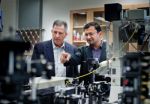(Press-News.org) PHILADELPHIA—Reporting in the June 25 issue of JAMA, researchers from Penn Medicine and other institutions found that 3D mammography—known as digital breast tomosynthesis— found significantly more invasive, or potentially lethal, cancers than a traditional mammogram alone and reduced call-backs for additional imaging. This is the largest study reported to date—with nearly a half a million women—measuring the effectiveness of the technology, and could potentially lead to a change in the standard of care for breast screening.
"It's the most exciting improvement to mammography that I have seen in my career, even more important for women than the conversion from film-screen mammography to digital mammography," said senior author Emily F. Conant, MD, chief of Breast Imaging the department of Radiology at the Perelman School of Medicine at the University of Pennsylvania. "3D mammography finds more clinically significant breast cancers earlier, which is the key so that women have moretreatment options and ultimately better health outcomes."
In the retrospective study, the researchers looked at 281,187 digital mammography examinations and 173,663 examinations with both tomosynthesis and digital mammography between 2010 and 2012. The data set included women from a wide range of breast cancer screening programs that were both geographically diverse and included both academic and community practices, 13 in total.
Researchers found 41 percent more invasive cancers when women were screened with tomosynthesis plus digital compared to digital mammography alone. The use of tomosynthesis also reduced the number of women called back for unnecessary screenings due to false alarms by 15 percent.
Conventional digital mammography is the most widely-used screening modality for breast cancer, but may yield suspicious findings that turn out not to be cancer, known as false-positives. Such findings are associated with a higher recall rate, or the rate at which women are called back for additional imaging or biopsy that may be deemed unnecessary.
Tomosynthesis, however, allows for 3-D reconstruction of the breast tissue, giving radiologists a clearer view of the overlapping slices of breast tissue. And though a relatively new technology, it has shown promise at reducing recall rates in all groups of patients, including younger women and those with dense breast tissue, and better detection rates in smaller studies. In 2011, tomosynthesis was approved by the U.S. Food and Drug Administration to be used in combination with standard digital mammography for breast cancer screening.
3D mammography is the only method used for breast cancer imaging that has demonstrated this combined benefit, the authors report. While 3D mammography found more invasive cancers, detection of in situ cancers (non-invasive cancers) was similar to a traditional mammography.
Since October 2011, all screening
mammograms at Penn Medicine's Perelman Center for Advanced Center now include tomosynthesis according to Dr. Conant.
"The coming years will be very exciting, as we see further improvements in this innovative technology," said Conant. "This new technology will certainly change the way we screen women."
INFORMATION:
The study also included lead author Sarah M. Friedewald, MD, of the Caldwell Breast Center at Advocate Lutheran General Hospital; Elizabeth Rafferty, MD; Stephen L. Rose, MD; Melissa Durand, MD; Donna Plecha, MD; Julianne Greenberg, MD; Mary K. Hayes, MD; Debra S. Copit, MD; Kara Carlson, MD; Thomas Cink, MD; Lora Barke, MD; Linda Greer, MD; and David Miller, MS.
3D mammography detects more invasive cancers and reduces call-back rates
2014-06-24
ELSE PRESS RELEASES FROM THIS DATE:
3D Mammography finds more invasive cancers and reduces unnecessary recalls
2014-06-24
CLEVELAND – 3D Mammography finds significantly more invasive cancers and reduces unnecessary recalls, according to a large, retrospective study published in June 25 issue of the Journal of the American Medical Association (JAMA). The study features data from University Hospitals Case Medical Center Seidman Cancer Center.
The study, the largest of its kind, focused on the impact of 3D mammography at a diverse range of sites across the U.S, looking at nearly half a million mammograms at 13 sites.
Key Findings:
41% increase in invasive cancer detected with 3D mammography
15% ...
Chronic migraine has a substantial impact on marriage and parenting
2014-06-24
A web-based study of 994 men and women with chronic migraine found that the condition significantly impacts family relationships and activities, including cancelled vacation plans and reduced quality time with partners and children. Feelings of guilt, anger and annoyance toward family members due to headache, and avoidance of sexual intimacy due to headache also were reported. Chronic migraine is generally defined as migraine with headaches occurring 15 or more days per month.
The Family Burden of Chronic Migraine to the Migraineur: Results of the CaMEO (Chronic Migraine ...
Demonstrating a driverless future
2014-06-24
In the coming decades, we will likely commute to work and explore the countryside in autonomous, or driverless, cars capable of communicating with the roads they are traveling on. A convergence of technological innovations in embedded sensors, computer vision, artificial intelligence, control and automation, and computer processing power is making this feat a reality.
This week, researchers from Carnegie Mellon University (CMU) will mark a significant milestone, demonstrating one of the most advanced autonomous vehicles ever designed, capable of navigating on urban roads ...
Can coral save our oceans?
2014-06-24
Coral reefs are home to a rich and diverse ecosystem, providing a habitat for a wide range of marine animals. But the increasing acidification of ocean water is jeopardizing the calcified foundations of these reefs, endangering the survival of thousands upon thousands of resident species.
New research by Prof. Yehuda Benayahu, Dr. Zehava Barkay, Prof. Maoz Fine, and their jointly supervised graduate student Yasmin Gabay of Tel Aviv University's Department of Zoology, Wolfson Applied Materials Research Center and the Interuniversity Institute for Marine Sciences in Eilat ...
UT Arlington nanoparticles could provide easier route for cell therapy
2014-06-24
UT Arlington physics researchers may have developed a way to use laser technology to deliver drug and gene therapy at the cellular level without damaging surrounding tissue. The method eventually could help patients suffering from genetic conditions, cancers and neurological diseases.
In a study published recently by the journal Nature Scientific Reports, the team paired crystalline magnetic carbon nanoparticles and continuous wave near-infrared laser beams for in what is called photothermal delivery. Authors of the new paper are Ali Koymen, a professor of physics; Samarendra ...
How to protect an American wildlife legacy
2014-06-24
A new paper shows that while science plays a critical role in informing conservation action, scientists must move beyond the realm of their expertise into less familiar areas like public relations, education, and even politics, to ultimately meet America's conservation goals.
The paper, "Moving Beyond Science to Protect a Mammalian Migration Corridor," appears in the current online edition on the journal Conservation Biology, and will appear in Volume 28 of the print edition. Authors are Joel Berger of the Wildlife Conservation Society (WCS) and the University of Montana, ...
Group recommends removing sexual orientation-related disorders from the ICD
2014-06-24
A working group evaluating sexual orientation-related disorders listed in the International Classification of Diseases (ICD), a publication of the World Health Organization (WHO), has recommended the disorders be deleted, a move that will make getting health care easier for gays and others who may have gender atypicality.
The WHO is the world body charged with deciding what is a disease and more than 170 countries, including the United States, follow their recommendations. The organization is currently revising the 10th edition of the ICD for release of the 11th edition ...
UMMS scientists show that monarch butterflies employ a magnetic compass during migration
2014-06-24
WORCESTER, MA – Each fall millions of monarch butterflies use a sophisticated navigation system to transverse 2,000 miles from breeding sites across the eastern United States to an overwintering habitat in specific groves of fir trees in central Mexico. Scientists at the University of Massachusetts Medical School and Worcester Polytechnic Institute have identified a new component of this complex system. They reported in Nature Communications that monarchs use a light-dependent, inclination magnetic compass to help them orient southward during migration.
"Taken as a whole, ...
Cancer risks increase with complex heart tests
2014-06-24
Complex heart imaging can increase cancer risks for children throughout their lifetime, according to a new study co-authored by Le Bonheur Cardiologist Jason Johnson, MD, MHS. The study, which appears in the June 9, 2014 issue of the American Heart Association's journal Circulation, is the first in which researchers quantified cumulative radiation doses in pediatric heart patients and predicted lifetime cancer risks based on the types of exposures.
In the study, Johnson and fellow researchers found that radiation from standard X-rays don't significantly raise cancer risks ...
Those with episodic amnesia are not 'stuck in time,' says philosopher Carl Craver
2014-06-24
In 1981, a motorcycle accident left Toronto native Kent Cochrane with severe brain damage and dramatically impaired episodic memory. Following the accident, Cochrane could no longer remember events from his past. Nor could he predict specific events that might happen in the future.
When neuroscientist Endel Tulving, PhD, asked him to describe what he would do tomorrow, Cochrane could not answer and described his state of mind as "blank."
Psychologists and neuroscientists came to know Cochrane, who passed away earlier this year, simply as "KC." Many scientists have described ...




